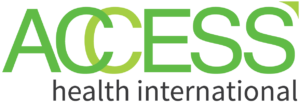
| On September 29, 2021, ACCESS Health launched a Special Interest Group series in India, aimed at creating a platform for knowledge sharing and dialogue between Fintech and HealthTech players, and to catalyze creation of new partnerships and models to support health financing for the lower income segment. Over forty representatives from leading health tech, fintech, insurance, telecommunications, and e-commerce sector, along with development partners and relevant government representatives participated in the launch session.
Objectives of the launch were to: 1) Give an overview of the Fintech for Health program, 2) Understand the intent of the Government of India’s National Digital Health Mission (NDHM) and its blueprint, its relevance to different industry players, and 3) Share an international model on Health Wallet, MTIBA, from Kenya. In 2019, ACCESS Health, with support from MetLife Foundation, launched the Fintech for Health program with the aim to explore opportunities at the intersection of Fintech and healthcare that enable low- and middle-income people to access affordable, high-quality healthcare. Ultimately, Fintech for Health program supports the tenets of universal health coverage, in its vision that all people can access quality care without suffering financial hardship, and in its administration, whereby public and private sector health systems are transparent, efficient, and effective. The aim of the Special Interest Group (SIG) in India is to enable knowledge sharing and form service partnerships and technology integrations that increase access to quality care, reduce out-of-pocket health expenditure burden, and support the administration and usage of public and private insurance programs. India will become the 4th largest market for digital payments in the world after Singapore, Sweden and USA. This will have a profound impact on Digital Health in the coming years, especially with the launch of the National Digital Health Mission. India is a major driver of adoption of digital health across payer and provider systems. During the first SIG, participants discussed ways to incentivize digital health savings without tax benefits, if fintech can ascribe monetary value to healthy habits and create an out of the box value chain, the use of consented health data playing, and the average cost of processing an outpatient insurance claim. Participants in the SIG also discussed how the Government of India is embarking on the journey of digitizing every patient visit to be documented and how this will make payments across healthcare journey more transparent and secure. Digital transactions utilized for appointment fees, refilling medications, and laboratory tests, among others, allows for traceability for insurance companies even from an actuarial perspective. Such system level gaps provide an opportunity to integrate finance technologies (fintech) into the provision and purchasing of healthcare. Weaving in all the loose ends to provide a comprehensive technology solution fueled by fintech transformations, it is easy to see how a health eWallet could be a valuable product. This digital health wallet can serve as an interface to make digital payments for all healthcare expenditures incurred by a patient in both outpatient and inpatient settings. In this context, the model on MTIBA from Kenya was shared and appreciated by the audience. Participants in the SIG showed great interest in continuing the dialogue on Fintech for Health models, the potential for health eWallets in India, and to discuss further the benefits of bundled financial service products geared specifically towards healthcare. This month, the ACCESS Health Digital Health team will organize a follow-up SIG session. This session will aim to engage participants to share their Fintech for Health products and models and find common ground on which to collaborate. The upcoming sessions will also aim to draft a proof of concept of the health eWallet that is expected to play a vital role in bringing together the payers and providers from the National Digital Health Ecosystem (NDHE) and how to incorporate international best practice moving forward. Please see blog post on the next Special Interest Group Series Launched in India here Authors: Sireesha Perabathina, Senior Consultant at ACCESS Health International For more information contact [email protected] |


